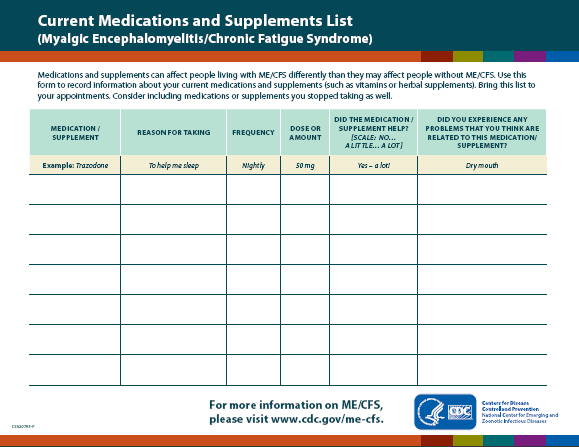What to know
Medications - over the counter and prescription - are often used to help treat symptoms in people with ME/CFS. In particular, clinicians often use medications to treat sleep difficulties, cognitive problems, pain, and other symptoms in people with ME/CFS. Clinicians should be aware that many patients with ME/CFS are especially sensitive to medications. They may only tolerate or need less than a full dose.

Over-the-Counter and Prescription Medicines
People with ME/CFS are often more sensitive to medicines than people without ME/CFS. This is particularly true when they take any medication that acts on the central nervous system, such as sedating medications. Therapeutic benefits can often be achieved at lower-than-standard doses. People with ME/CFS might tolerate or need only a fraction of the usual recommended medication dose. After initial management with lower dosing, clinicians may consider gradual increases as necessary and as tolerated by the patient.
All medications can cause side effects, which may lead to new symptoms or worsen existing symptoms. So, it is important to routinely monitor all prescription drugs, over-the-counter medicines, and supplements. It is also important to be mindful of possible interactions.
Some drugs act on multiple body systems and symptoms. For instance, tricyclic drugs may not only improve mood, but can help with sleep and pain. In some people, however, they can worsen orthostatic intolerance. Prescribing such drugs can allow the use of fewer medications to address multiple symptoms, sometimes with minimal or tolerable side effects.
Nutritional and Herbal Supplements
People with ME/CFS frequently use vitamins and other nutritional and herbal supplements. These products are unregulated and information on potency and side effects is often unknown. Because of this, healthcare providers and people with ME/CFS need to talk about nutritional and herbal supplements. This should occur before a patient begins taking the supplements if possible. During conversations, consider safety, effectiveness, and possible interactions between prescribed medications and over-the-counter supplements.
Nutritional supplements cannot take the place of good diet and nutrition. A well-balanced diet is important for everyone, including people with ME/CFS, and should be encouraged. It is important to educate patients about all potential therapies. Be aware that many treatments that are promoted as cures for ME/CFS are unproven, often costly, and could be dangerous.
Resources
Current Medications and Supplements List
- Disclaimer: The content of this ME/CFS website is for informational purposes only and does not represent a federal guideline or recommendation for the treatment of ME/CFS. The information provided on this website is not intended to be a substitute for the medical judgment of the healthcare provider and does not indicate an exclusive course of action or treatment.

